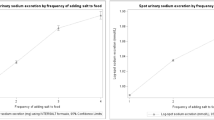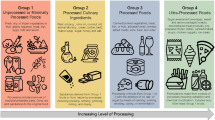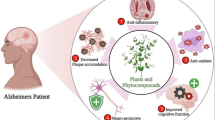Abstract
Epidemiological studies of sugar-sweetened beverages (SSBs) and artificially sweetened beverages (ASBs) with Alzheimer’s disease (AD) have provided controversial findings. Furthermore, little is known about the association between pure fruit/vegetable juices and AD. The present study aims to estimate the associations of SSBs, ASBs, and pure fruit/vegetable juices with AD, and to evaluate the theoretical effects of replacing SSBs and ASBs with the different consumption of pure fruit/vegetable juices on the risk of AD. This prospective cohort study of the UK Biobank included 206,606 participants aged 39–72 years free of dementia at baseline between 2006 and 2010. Dietary intake of SSBs, ASBs, and pure fruit/vegetable juices (naturally sweet juices) were collected using a 24-h dietary recall questionnaire completed between 2009 and 2012. Incident AD was identified by medical and mortality records. Cox proportional hazard models and substitution models were conducted to estimate hazard ratios (HRs) and 95% confidence intervals (CIs). A total of 699 cases of AD were identified over a median follow-up of 9.5 years. The consumption of SSBs and ASBs (> 2 units/d) were associated with a higher risk of AD. However, participants who drank > 1–2 units/d of pure fruit/vegetable juices were associated with a lower risk of AD. In substitution models, replacing SSBs with an equivalent consumption of pure fruit/vegetable juices could be associated with a risk reduction of AD.



Similar content being viewed by others
Data availability
Data of the UK Biobank is available upon acceptance of a research proposal submitted to UK Biobank Resources (https://www.ukbiobank.ac.uk/).
References
WHO., Dementia. A public health priority. Geneva, Switzerland: WHO Press2012.
Kivipelto M, Mangialasche F, Ngandu T. Lifestyle interventions to prevent cognitive impairment, dementia and Alzheimer disease. Nat Rev Neurol. 2018;14:653–66. https://doi.org/10.1038/s41582-018-0070-3.
Brambilla D, Le Droumaguet B, Nicolas J, Hashemi SH, Wu LP, Moghimi SM, et al. Nanotechnologies for Alzheimer’s disease: diagnosis, therapy, and safety issues. Nanomedicine. 2011;7:521–40. https://doi.org/10.1016/j.nano.2011.03.008.
Ng SW, Ni Mhurchu C, Jebb SA, Popkin BM. Patterns and trends of beverage consumption among children and adults in Great Britain, 1986–2009. Br J Nutr. 2012;108:536–51. https://doi.org/10.1017/S0007114511006465.
Welsh JA, Sharma AJ, Grellinger L, Vos MB. Consumption of added sugars is decreasing in the United States. Am J Clin Nutr. 2011;94:726–34. https://doi.org/10.3945/ajcn.111.018366.
Louie JC, Moshtaghian H, Rangan AM, Flood VM, Gill TP. Intake and sources of added sugars among Australian children and adolescents. Eur J Nutr. 2016;55:2347–55. https://doi.org/10.1007/s00394-015-1041-8.
Singh GM, Micha R, Khatibzadeh S, Lim S, Ezzati M, Mozaffarian D, et al. Estimated global, regional, and national disease burdens related to sugar-sweetened beverage consumption in 2010. Circulation. 2015;132:639–66. https://doi.org/10.1161/CIRCULATIONAHA.114.010636.
Daher M, Fahd C, Nour AA, Sacre Y. Trends and amounts of consumption of low-calorie sweeteners: a cross-sectional study. Clin Nutr ESPEN. 2022;48:427–33. https://doi.org/10.1016/j.clnesp.2022.01.006.
de Koning L, Malik VS, Kellogg MD, Rimm EB, Willett WC, Hu FB. Sweetened beverage consumption, incident coronary heart disease, and biomarkers of risk in men. Circulation. 2012;125(1735–41):S1. https://doi.org/10.1161/CIRCULATIONAHA.111.067017.
Malik VS, Li Y, Pan A, De Koning L, Schernhammer E, Willett WC, et al. Long-term consumption of sugar-sweetened and artificially sweetened beverages and risk of mortality in US adults. Circulation. 2019;139:2113–25. https://doi.org/10.1161/CIRCULATIONAHA.118.037401.
Narain A, Kwok CS, Mamas MA. Soft drinks and sweetened beverages and the risk of cardiovascular disease and mortality: a systematic review and meta-analysis. Int J Clin Pract. 2016;70:791–805. https://doi.org/10.1111/ijcp.12841.
Li Y, Zhang D, Pagan JA. Social norms and the consumption of fruits and vegetables across New York City neighborhoods. J Urban Health. 2016;93:244–55. https://doi.org/10.1007/s11524-016-0028-y.
Anderson AS, Cox DN, McKellar S, Reynolds J, Lean ME, Mela DJ. Take Five, a nutrition education intervention to increase fruit and vegetable intakes: impact on attitudes towards dietary change. Br J Nutr. 1998;80:133–40. https://doi.org/10.1017/s0007114598001032.
Benton D, Young HA. Role of fruit juice in achieving the 5-a-day recommendation for fruit and vegetable intake. Nutr Rev. 2019;77:829–43. https://doi.org/10.1093/nutrit/nuz031.
Pase MP, Himali JJ, Beiser AS, Aparicio HJ, Satizabal CL, Vasan RS, et al. Sugar-and artificially sweetened beverages and the risks of incident stroke and dementia: a prospective cohort study. Stroke. 2017;48:1139–46. https://doi.org/10.1161/STROKEAHA.116.016027.
Miao H, Chen K, Yan X, Chen F. Sugar in beverage and the risk of incident dementia, alzheimer’s disease and stroke: a prospective cohort study. J Prev Alzheimers Dis. 2021;8:188–93. https://doi.org/10.14283/jpad.2020.62.
Munoz-Garcia MI, Martinez-Gonzalez MA, Martin-Moreno JM, Razquin C, Cervantes S, Guillen-Grima F, et al. Sugar-sweetened and artificially-sweetened beverages and changes in cognitive function in the SUN project. Nutr Neurosci. 2020;23:946–54. https://doi.org/10.1080/1028415X.2019.1580919.
Sun Q, Yang Y, Wang X, Yang R, Li X. The association between sugar-sweetened beverages and cognitive function in middle-aged and older people: a meta-analysis. J Prev Alzheimers Dis. 2022;9:323–30. https://doi.org/10.14283/jpad.2021.71.
Willett W. Nutritional epidemiology. 3rd ed. Oxford: Oxford University Press; 2012.
Julia C, Mejean C, Peneau S, Buscail C, Alles B, Fezeu L, et al. The 5-CNL front-of-pack nutrition label appears an effective tool to achieve food substitutions towards healthier diets across dietary profiles. PLoS One. 2016;11:e0157545. https://doi.org/10.1371/journal.pone.0157545.
Scheffers FR, Boer JM, Wijga AH, van der Schouw YT, Smit HA, Verschuren WM. Substitution of pure fruit juice for fruit and sugar-sweetened beverages and cardiometabolic risk in European Prospective Investigation into Cancer and Nutrition (EPIC)-NL: a prospective cohort study. Public Health Nutr. 2022;25:1504–14. https://doi.org/10.1017/S1368980021000914.
Sudlow C, Gallacher J, Allen N, Beral V, Burton P, Danesh J, et al. UK biobank: an open access resource for identifying the causes of a wide range of complex diseases of middle and old age. PLoS Med. 2015;12:e1001779. https://doi.org/10.1371/journal.pmed.1001779.
Collins R. What makes UK Biobank special? Lancet. 2012;379:1173–4. https://doi.org/10.1016/s0140-6736(12)60404-8.
Liu B, Young H, Crowe FL, Benson VS, Spencer EA, Key TJ, et al. Development and evaluation of the Oxford WebQ, a low-cost, web-based method for assessment of previous 24 h dietary intakes in large-scale prospective studies. Public Health Nutr. 2011;14:1998–2005. https://doi.org/10.1017/S1368980011000942.
Anderson JJ, Gray SR, Welsh P, Mackay DF, Celis-Morales CA, Lyall DM, et al. The associations of sugar-sweetened, artificially sweetened and naturally sweet juices with all-cause mortality in 198,285 UK Biobank participants: a prospective cohort study. BMC Med. 2020;18:97. https://doi.org/10.1186/s12916-020-01554-5.
Perez-Cornago A, Pollard Z, Young H, van Uden M, Andrews C, Piernas C, et al. Description of the updated nutrition calculation of the Oxford WebQ questionnaire and comparison with the previous version among 207,144 participants in UK Biobank. Eur J Nutr. 2021;60:4019–30. https://doi.org/10.1007/s00394-021-02558-4.
Health and Deprivation P Townsend P Phillimore A Beattie Health and Deprivation Published by Croom Helm 212pp pound19.95 0–7099–4351–2 [Formula: see text]. Nurs Stand. 1988;2:34. https://doi.org/10.7748/ns.2.17.34.s66
Bycroft C, Freeman C, Petkova D, Band G, Elliott LT, Sharp K, et al. The UK Biobank resource with deep phenotyping and genomic data. Nature. 2018;562:203–9. https://doi.org/10.1038/s41586-018-0579-z.
Liao SG, Lin Y, Kang DD, Chandra D, Bon J, Kaminski N, et al. Missing value imputation in high-dimensional phenomic data: imputable or not, and how? BMC Bioinformatics. 2014;15:346. https://doi.org/10.1186/s12859-014-0346-6.
Mansournia MA, Altman DG. Population attributable fraction. BMJ. 2018;360:k757. https://doi.org/10.1136/bmj.k757.
Willett WC, Howe GR, Kushi LH. Adjustment for total energy intake in epidemiologic studies. Am J Clin Nutr. 1997;65:1220S-8S. https://doi.org/10.1093/ajcn/65.4.1220S. (discussion 9S-31S).
Ibsen DB, Laursen ASD, Wurtz AML, Dahm CC, Rimm EB, Parner ET, et al. Food substitution models for nutritional epidemiology. Am J Clin Nutr. 2021;113:294–303. https://doi.org/10.1093/ajcn/nqaa315.
Song M, Giovannucci E. Substitution analysis in nutritional epidemiology: proceed with caution. Eur J Epidemiol. 2018;33:137–40. https://doi.org/10.1007/s10654-018-0371-2.
Liang J, Hu Z, Zhan C, Wang Q. Using propensity score matching to balance the baseline characteristics. J Thorac Oncol. 2021;16:e45–6. https://doi.org/10.1016/j.jtho.2020.11.030.
Tingley D, Yamamoto T, Hirose K, Keele L, Imai K. Mediation: R Package for Causal Mediation Analysis. J Stat Softw. 2014;59(5):1–38. https://doi.org/10.18637/jss.v059.i05.
Krikorian R, Nash TA, Shidler MD, Shukitt-Hale B, Joseph JA. Concord grape juice supplementation improves memory function in older adults with mild cognitive impairment. Br J Nutr. 2010;103:730–4. https://doi.org/10.1017/S0007114509992364.
Kean RJ, Lamport DJ, Dodd GF, Freeman JE, Williams CM, Ellis JA, et al. Chronic consumption of flavanone-rich orange juice is associated with cognitive benefits: an 8-wk, randomized, double-blind, placebo-controlled trial in healthy older adults. Am J Clin Nutr. 2015;101:506–14. https://doi.org/10.3945/ajcn.114.088518.
Kent K, Charlton K, Roodenrys S, Batterham M, Potter J, Traynor V, et al. Consumption of anthocyanin-rich cherry juice for 12 weeks improves memory and cognition in older adults with mild-to-moderate dementia. Eur J Nutr. 2017;56:333–41. https://doi.org/10.1007/s00394-015-1083-y.
Lamport DJ, Saunders C, Butler LT, Spencer JP. Fruits, vegetables, 100% juices, and cognitive function. Nutr Rev. 2014;72:774–89. https://doi.org/10.1111/nure.12149.
Lawman HG, Bleich SN, Yan J, LeVasseur MT, Mitra N, Roberto CA. Unemployment claims in Philadelphia one year after implementation of the sweetened beverage tax. PLoS One. 2019;14:e0213218. https://doi.org/10.1371/journal.pone.0213218.
Berger N, Cummins S, Allen A, Smith RD, Cornelsen L. Patterns of beverage purchases amongst British households: a latent class analysis. PLoS Med. 2020;17:e1003245. https://doi.org/10.1371/journal.pmed.1003245.
Manyema M, Veerman LJ, Chola L, Tugendhaft A, Sartorius B, Labadarios D, et al. The potential impact of a 20% tax on sugar-sweetened beverages on obesity in South African adults: a mathematical model. PLoS One. 2014;9:e105287. https://doi.org/10.1371/journal.pone.0105287.
Swithers SE, Davidson TL. A role for sweet taste: calorie predictive relations in energy regulation by rats. Behav Neurosci. 2008;122:161–73. https://doi.org/10.1037/0735-7044.122.1.161.
Malik VS, Popkin BM, Bray GA, Despres JP, Hu FB. Sugar-sweetened beverages, obesity, type 2 diabetes mellitus, and cardiovascular disease risk. Circulation. 2010;121:1356–64. https://doi.org/10.1161/CIRCULATIONAHA.109.876185.
Winkelmayer WC, Stampfer MJ, Willett WC, Curhan GC. Habitual caffeine intake and the risk of hypertension in women. JAMA. 2005;294:2330–5. https://doi.org/10.1001/jama.294.18.2330.
Launer LJ, Ross GW, Petrovitch H, Masaki K, Foley D, White LR, et al. Midlife blood pressure and dementia: the Honolulu-Asia aging study. Neurobiol Aging. 2000;21:49–55. https://doi.org/10.1016/s0197-4580(00)00096-8.
Chatterjee S, Peters SA, Woodward M, Mejia Arango S, Batty GD, Beckett N, et al. Type 2 diabetes as a risk factor for dementia in women compared with men: a pooled analysis of 2.3 million people comprising more than 100,000 cases of dementia. Diabetes Care. 2016;39:300–7. https://doi.org/10.2337/dc15-1588.
Qin P, Li Q, Zhao Y, Chen Q, Sun X, Liu Y, et al. Sugar and artificially sweetened beverages and risk of obesity, type 2 diabetes mellitus, hypertension, and all-cause mortality: a dose-response meta-analysis of prospective cohort studies. Eur J Epidemiol. 2020;35:655–71. https://doi.org/10.1007/s10654-020-00655-y.
Hu D, Cheng L, Jiang W. Sugar-sweetened beverages consumption and the risk of depression: a meta-analysis of observational studies. J Affect Disord. 2019;245:348–55. https://doi.org/10.1016/j.jad.2018.11.015.
Tucker KL, Qiao N, Scott T, Rosenberg I, Spiro A 3rd. High homocysteine and low B vitamins predict cognitive decline in aging men: the Veterans Affairs Normative Aging Study. Am J Clin Nutr. 2005;82:627–35. https://doi.org/10.1093/ajcn.82.3.627.
Akbaraly NT, Faure H, Gourlet V, Favier A, Berr C. Plasma carotenoid levels and cognitive performance in an elderly population: results of the EVA Study. J Gerontol A Biol Sci Med Sci. 2007;62:308–16. https://doi.org/10.1093/gerona/62.3.308.
Clemens R, Drewnowski A, Ferruzzi MG, Toner CD, Welland D. Squeezing fact from fiction about 100% fruit juice. Adv Nutr. 2015;6:236S-43S. https://doi.org/10.3945/an.114.007328.
Jiang W, Wei H, He B. Dietary flavonoids intake and the risk of coronary heart disease: a dose-response meta-analysis of 15 prospective studies. Thromb Res. 2015;135:459–63. https://doi.org/10.1016/j.thromres.2014.12.016.
Hertog MG, Feskens EJ, Hollman PC, Katan MB, Kromhout D. Dietary antioxidant flavonoids and risk of coronary heart disease: the Zutphen Elderly Study. Lancet. 1993;342:1007–11. https://doi.org/10.1016/0140-6736(93)92876-u.
Acknowledgements
We thank the participants of the UK Biobank. This research has been conducted using the UK Biobank Resource under Application Number 45676.
Funding
This work was supported by the National Natural Science Foundation of China (No. 91746205) and Major Science and Technology Project of Public Health in Tianjin (No. 21ZXGWSY00090).
Author information
Authors and Affiliations
Contributions
Y.W. conceptualized and designed the study. Y.W. and H.Y. had full access to all data. Y.C. and Y.Z. performed the data analysis. Y.C. and Y.Z. drafted the manuscript. M.Z. contributed to analysis and interpretation of data. H.L. and L.Z. contributed to revision of the manuscript and approved the final draft. All authors contributed to the intellectual content, critical revisions to the drafts of the paper and approved the final version.
Corresponding author
Ethics declarations
Conflict of interest
The authors have declared that no competing interests exist.
Supplementary Information
Below is the link to the electronic supplementary material.
About this article
Cite this article
Chen, Y., Zhang, Y., Yang, H. et al. Associations of sugar-sweetened, artificially sweetened, and naturally sweet juices with Alzheimer’s disease: a prospective cohort study. GeroScience 46, 1229–1240 (2024). https://doi.org/10.1007/s11357-023-00889-0
Received:
Accepted:
Published:
Issue Date:
DOI: https://doi.org/10.1007/s11357-023-00889-0




